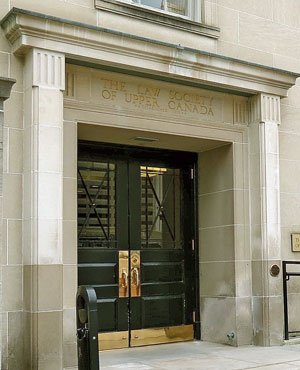The Law Society of Upper Canada has disbarred a Richmond Hill, Ont. lawyer after finding she acted as an escrow agent in an illegitimate investment scheme worth $8-million.

The law society’s disciplinary tribunal revoked Margaret Anderson-Clarke’s licence, deeming she had engaged in professional misconduct by knowingly assisting in “dishonest conduct.”
Five investors made complaints to the law society about their dealings with Anderson-Clarke. They individually entered investment agreements with a United States-based company, called A.I. in the decision, which required them to deposit money into a trust account held in escrow by Anderson-Clarke between 2010 and 2011. All together, they entrusted her with more than $8 million.
Anderson-Clarke then released those funds to A.I. and its representatives under the instruction of the company, but without the consent of the investors, according to the decision.
“For each of the five particulars relating to each investor, we find that the Lawyer knew, was reckless or wilfully blind to the dishonest conduct that she assisted,” bencher Anne Vespry wrote in the decision,
Law Society of Upper Canada v. Anderson-Clarke, on behalf of a panel.
Those funds were meant to be collateral to let A.I. trade for the investors. At the end of a trading period, the deposit, as well as what was expected to be a high return, would be given back to the investors. But the investors received nothing back despite the fact that the escrow agreements held that the money would be returned to them.
They had not been able to recover the funds at the time of the law society hearing.
The investment agreements promised abnormally high returns without clarity on how they would be generated — something Dennis Wiebe, a partner with Dentons Canada LLP, said should have been one of a number of red flags for the lawyer. Wiebe provided expert opinion in the tribunal proceedings.
The investment agreements were also “vague, internally inconsistent and nonsensical in parts” and were clearly not in the interests of the investors, according to the decision.
“Even to a lawyer inexperienced in such matters, it should have been clear that something was wrong,” Vespry wrote in the decision.
Other red flags Wiebe identified included the fact that the agreements gave granting power to A.I. as an “authorized agent.”
“While Mr. Wiebe’s experienced opinion lists many factors that should alert a lawyer versed in financing matters, we rely on the common sense proposition that an offer of something for nothing, or high return for no risk, constitutes a red flag that any reasonably competent lawyer would see as a cause for, at the very least, further investigation,” Vespry said in the decision.
The tribunal found that Anderson-Clarke did not engage in any investigation concerning the agreements and did not consult more experienced counsel about the obligations in holding an escrow account.
When she received requests from investors asking for information of the funds, Anderson-Clarke forwarded the requests to A.I. and then used responses written by the company, which did not disclose the investors’ money was no longer in escrow, the decision said.
Anderson-Clarke also continued to accept money from other investors even after the first investor complained about the unauthorized disbursal of his funds.
The tribunal inferred that it is more than likely than not that Anderson-Clarke acted with knowledge of A.I.’s dishonest conduct when she accepted money from some of the latter investors into escrow accounts.
Anderson-Clarke did not respond to a Request to Admit detailing the allegations against her, which under the law society’s rules, means she is “deemed to admit the facts it sets out.”
Anderson-Clarke, however, has since submitted that she does not accept the allegations, and said that she did not become aware of the fraud until after it was too late and the funds were lost. She also said that if she had contested the allegations, it would have been her position that her medical condition and stress in her life had impaired her ability to see the red flags.
“It is important to understand that Ms. Anderson-Clarke does not admit the allegations that she knowingly participated in the investment fraud. If not for her extenuating personal circumstances, she would have led evidence vigorously disputing those allegations,” says John Dent, the lawyer who represented Anderson-Clarke.
“She understood that by not contesting the allegations, her licence would be revoked. She is focused now on her well-being, and the well-being of her family.”
In addition to disbarring Anderson-Clarke, the law society fined her $12,000, which she has to pay within five years.
Anderson-Clarke’s husband, Edmund Clarke, has also been disbarred. The Law Society of Upper Canada revoked his licence in 2010, after a disciplinary tribunal found he had knowingly participated in mortgage fraud to induce a lender to approve mortgage loans to Anderson-Clarke.
In 2003, a law society hearing panel found that Clarke had misappropriated and misapplied trust funds and had failed to maintain books and records. He was subsequently suspended for a month.

 The law society’s disciplinary tribunal revoked Margaret Anderson-Clarke’s licence, deeming she had engaged in professional misconduct by knowingly assisting in “dishonest conduct.”
The law society’s disciplinary tribunal revoked Margaret Anderson-Clarke’s licence, deeming she had engaged in professional misconduct by knowingly assisting in “dishonest conduct.”